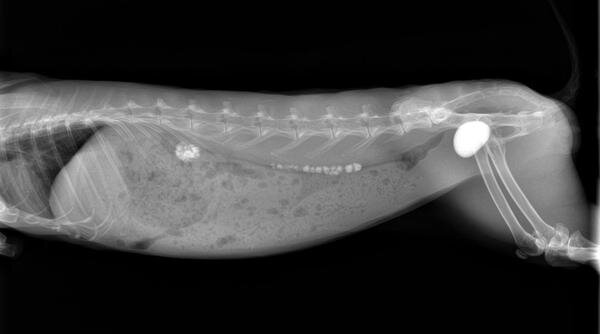|
Safe Salads: How high calcium vegetables affect your rabbit
By BUNS Volunteer Jean Silva
We’ve all seen the yellowish white crust in the bottom of the litter box. It is calcium. Rabbits need calcium. Calcium helps growing rabbits build strong bones and teeth. Adult rabbits, because their teeth continue to grow, continue to need calcium. A 5.5 pound adult rabbit needs around 510 milligrams (mg) per day. A shortage of calcium in the diet is suspected as a cause of weak bones and dental disease.
Rabbits absorb calcium into their blood stream from their gut. The process is passive. The more calcium in the gut, the more calcium is absorbed into the blood stream. It is up to the kidneys to filter excess calcium out of the blood stream. Calcium is passed from the kidneys, in urine, to the bladder and your litter box. The calcium builds up in the litter box as a yellowish white crust. This is normal.
Sometimes, though, calcium begins to accumulate in the bladder or kidneys. Ask your vet, but they will tell you that no one knows exactly why this happens. But a build up of calcium in the kidneys and bladder IS a problem. So, as you clean the litter box, keep an eye out for visible amounts of calcium floating in the urine. Calcium can show up as a white, sludgy grit or fine sandy gravel that your pet will pass in along with urine. As you can imagine, passing sludge or fine gravel is painful. A trip to the vet is called for.
Calcium can also form stones in the bladder and the kidneys. Stones in the bladder scratch the bladder wall which opens the body to infection. Stones can also block the urethra preventing your pet from peeing. Large stones must be removed surgically: never a happy prospect. The illustration shows a rabbit that has stones in her kidney, urethra and a very large stone in her bladder
If you find that your pet is peeing sludge, dribbling pee, and/or straining to pee and tooth grinding while peeing, he may have a bladder stone. You will need to seek immediate veterinary care.
Although the causes of bladder stones are unknown, we can give our rabbits the healthiest diet we know how. That diet must include enough calcium to meet your bunny’s needs. Healthy levels of calcium can be found in grass hay. Grass hay should be 80% of your rabbit’s diet. Grass hay is what they evolved to eat. It keeps their teeth, gut, kidneys and bladder healthy. The same amount of alfalfa or clover hay, on the other hand has 2 to 5 times as much calcium.
Make your salad using vegetables that have moderate levels of calcium. I use a lot of cilantro, romaine or other lettuce, and chard. To these vegetables I may add one vegetable that is higher in calcium. When I make a salad I use a ratio of three vegetables with moderate calcium to one high calcium vegetable. Common vegetables with high levels of calcium are kale, parsley and dandelion greens. THe BUNS website has a list of calcium levels in vegetables for your use.
Pellets also provide needed calcium. The percentage of calcium is listed on each bag of pellets. For an adult rabbit, look for a pellet that shows the recommended level of 0.6%. Oxbow makes adult rabbit pellets with the recommended level of calcium. Do not feed pellet mixes, with grains, dried fruit and vegetables. When completely eaten, they will provide the calcium level shown on the bag. But rabbits will eat the items they prefer, causing their calcium intake to be different from that shown on the bag.
While fruit is low in calcium, it is recommended in small amounts only due to their high sugar content. Sugar, while not “dangerous” to rabbits, can make your bunny fat. It can also make your bunny turn up its nose at foods that are a healthier choice. Use fruit as a treat
For more information on calcium in rabbits and guinea pigs go to https://rabbit.org/lowering-blood-calcium/ and http://www.guinealynx.info/chart.html
For more information on Salads read: http://www.bunssb.org/bunnies/salad-days/

|